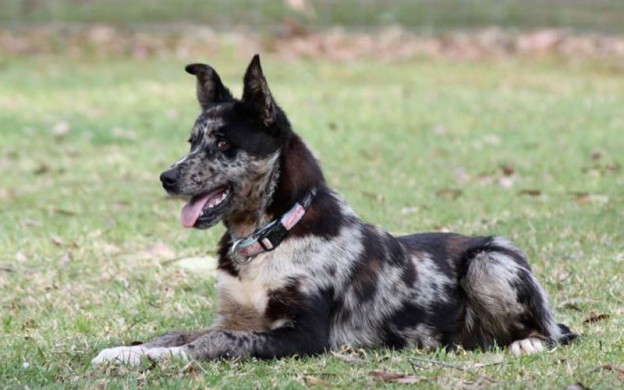
Facts
Personality: This gentle and noble dog makes a fantastic addition to any family. The breed is very adaptable and gets on extremely well with all family members, especially children. As long as your pooch is given a good dose of daily exercise and taken in as one of the pack, you will have an irreplaceable companion for life.
Favourite activities: Bred to hunt, the English Setter is inherently an active breed and needs and thrives on daily exercise and off-leash runs. It will enjoy playing with other dogs and gets on well with people and animals. Being part of the family, playing with the kids and snoozing on the couch next to dad after a good outing will keep this canine happy and fulfilled.
Watchdog qualities: A gentle and friendly dog, the English Setter was not made for protection. To the contrary, a would-be burglar may be invited into the house to play by this endearing breed.
Suitable for: Guardians of this breed should be active and have the time to take their pooch on daily outings. Owners also need to put time aside each week to groom their dogs coat. The English Setter does shed, so if you are house-proud, think twice before taking in this breed. Similarly, your Setter will want to spend time inside with the family. This dog is best suited to homes with an average-size yard and will not do well in an apartment.
Hereditary diseases: The English Setter is generally a healthy breed, but buyers should be aware of hip dysplasia. Being deep-chested, English Setters may also be at risk of bloat. Speak to your vet about ways to avoid the potentially fatal condition. Always buy from registered and reputable breeders and ask to see hip scores.
AN ENGLISH GENTLEMAN
Noble and loyal, the stately English Setter has heads turning wherever it goes. Michelle Segal reports.
The English Setters physical prowess and athleticism belie this breeds amazingly friendly nature. Bred to be a hunting dog, the English Setter has proved it is not only an outstanding gun dog, but also an affectionate and loyal canine which endears itself to anyone lucky enough to share a home with it.
The English Setter was bred from French hunting dogs in England in the 18th Century, taking its name from the position the dog would assume when it discovered game a crouching or setting stance. One of the oldest gundog breeds, this dog proved to be an agile and effective worker. It was excellent at covering large expanses of open country and helping its hunter guardians by finding, setting and pointing out game. Today, the English Setter is more of a companion breed than a worker, although it is still used in a working capacity in other countries and to a limited degree in Australia and New Zealand.
People-friendly
Considered the gentleman/lady of the setter world, the English Setter is probably the smallest of the four setter breeds (English, Gordon, Irish and Irish red and white) and is considered the most calm in nature.
Public officer and treasurer of the English Setter Association of Victoria, Heather Beasley acquired her first English Setter 28 years ago. My son was a 12-month-old baby, Beasley recalls. I had grown up with Boxers and a Dobermann, but was looking for a slightly less ‘exuberant’ breed to grow up with my baby. So I did some homework on finding a softer and more laid-back breed. I’m not sure why I chose to go with an English Setter at the time, but I remember I visited people with English Setters and fell in love with the puppies and the adult dogs.
This is a comfortable dog to own, as it gets on beautifully with children and adults alike. English Setters are generally very soft in nature, extremely friendly, adaptable, affectionate, trustworthy and love people, Beasley says. A medium-sized dog not too big, not too small I consider them a perfect fit. As long as they have their share of love and attention in the family, they fit in without question.
In fact, so friendly and gentle is this breed that if you are looking for a dog which could protect the family, you’d be barking up the wrong tree with this pooch. Rather than being suspicious of strangers, your English Setter may just welcome outsiders to come in and join the fun.
Exercise needs
While the English Setter is well-suited to most families, its origins as a hunter mean it is inherently an active breed that needs a good dose of daily exercise. Unless you are an active family able to dedicate time each day to exercising your dog, this may not be the breed for you. Without daily exercise, your English Setter may become bored, and bored dogs often turn to other diversions!
Another throwback from its hunting days is the English Setters close bond it forms with its guardians, and as a result its need to be taken in as one of the pack. This breed becomes very attached to its family and thrives when it spends time with its owners. Being a person-oriented breed, this dog will not be happy if left out in the yard without company.
As with all breeds, the English Setter needs to be trained and socialised from an early age to ensure it grows into a well-mannered and sociable adult.
Silky coat
The English Setters beautiful looks attract admiration wherever it goes, but regular grooming of the soft, silky coat is definitely an important part of owning this breed. The coat is not difficult to look after, but should be brushed a few times a week to prevent matts from forming. The coat should also be checked for burrs and other objects after walks and off-leash runs.
The English Setter is an average shedder, so if you are especially house proud, be aware that you will have hair around your home if you adopt this breed. Extra brushing during shedding times will help get rid of loose hair.
Breed Care
Daily: This breed needs regular daily exercise. A good walk and a run in an off-leash park will keep your English Setter happy. If you live in a tick-prone area, a daily check for ticks, especially during summer, is imperative. If you suspect your dog may have a tick, rush to your vet immediately. Check for burrs and other objects in the coat after walks.
Weekly: Brush a few times a week to keep the soft coat in good condition and to get rid of dead hairs. Check ears and trim nails.
Other: Bathe or dry shampoo when necessary. You may need to trim the hair on the bottom of your dogs feet and around the neck and ears. If you are not confident doing this yourself, speak with your vet, consult the breed club or take your pooch to a dog parlour. Gastro-intestinal worming is needed every three months for adults and more frequently for puppies, plus heartworming and vaccinations.
Breed Contacts
For more information
The English Setter Association of Victoria: www.englishsetters.com.au; (03) 9894 1070 or (03) 9853 6102
The English Setter Club of NSW: (02) 9489 5341
To find out more about the English Setter or to find a breeder, contact your state canine council via the Australian National Kennel Council (ANKC) at www.ankc.aust.com
In New Zealand, please contact the New Zealand Kennel Club via www.nzkc.org.nz







